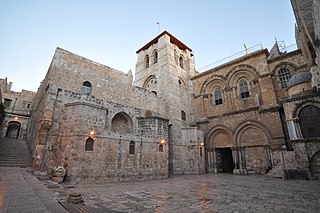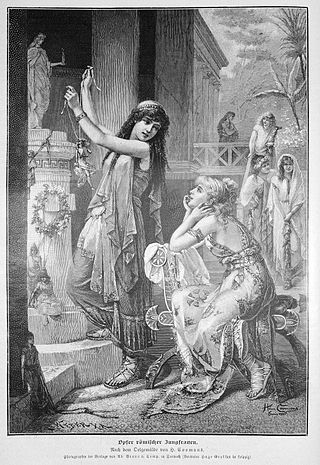Related Research Articles

Allah is the common Arabic word for God. In the English language, the word generally refers to God in Islam. The word is thought to be derived by contraction from al-ilāh, which means "the god", and is linguistically related to the Aramaic words Elah and Syriac ܐܲܠܵܗܵܐ (ʼAlāhā) and the Hebrew word El (Elohim) for God.

Bethlehem is a city in the West Bank, Palestine, located about 10 kilometres (6.2 mi) south of Jerusalem. It is the capital of the Bethlehem Governorate, and has a population of approximately 25,000 people. The city's economy is largely tourist-driven; international tourism peaks around and during Christmas, when Christians embark on a pilgrimage to the Church of the Nativity, revered as the location of the Nativity of Jesus. At the northern entrance of the city is Rachel's Tomb, the burial place of biblical matriarch Rachel. Movement around the city is limited due to the Israeli West Bank barrier.

Christianity is an Abrahamic monotheistic religion based on the life and teachings of Jesus. It is the world's largest and most widespread religion with roughly 2.4 billion followers representing one-third of the global population. Its adherents, known as Christians, are estimated to make up a majority of the population in 157 countries and territories. Christians believe that Jesus is the Son of God, whose coming as the Messiah was prophesied in the Hebrew Bible and chronicled in the New Testament.
Common Era (CE) and Before the Common Era (BCE) are year notations for the Gregorian calendar, the world's most widely used calendar era. Common Era and Before the Common Era are alternatives to the original Anno Domini (AD) and Before Christ (BC) notations used for the same calendar era. The two notation systems are numerically equivalent: "2023 CE" and "AD 2023" each describe the current year; "400 BCE" and "400 BC" are the same year.

Christmas is an annual festival commemorating the birth of Jesus Christ, observed primarily on December 25 as a religious and cultural celebration among billions of people around the world. A feast central to the Christian liturgical year, it is preceded by the season of Advent or the Nativity Fast and initiates the season of Christmastide, which historically in the West lasts twelve days and culminates on Twelfth Night. Christmas Day is a public holiday in many countries, is celebrated religiously by a majority of Christians, as well as culturally by many non-Christians, and forms an integral part of the holiday season organized around it.

The Eastern Orthodox Church, also called the Orthodox Church, Greek Orthodox Church, or officially the Orthodox Catholic Church, is the second-largest Christian church, with approximately 220 million baptised members. It operates as a communion of autocephalous churches, each governed by its bishops via local synods. The church has no central doctrinal or governmental authority analogous to the head of the Catholic Church—the pope, although the Ecumenical Patriarch of Constantinople is recognised by them as primus inter pares. As one of the oldest surviving religious institutions in the world, the Eastern Orthodox Church has played a prominent role in the history and culture of Western Asia, the Caucasus, and Eastern and Southeastern Europe.
Evangelicalism, also called evangelical Christianity or evangelical Protestantism, is a worldwide interdenominational movement within Protestant Christianity that emphasises the centrality of being "born again", in which an individual experiences personal conversion; the authority of the Bible as God's revelation to humanity; and spreading the Christian message. The word evangelical comes from the Greek (euangelion) word for "good news".

Halloween or Hallowe'en is a celebration observed in many countries on 31 October, the eve of the Western Christian feast of All Hallows' Day. It is at the beginning of the observance of Allhallowtide, the time in the liturgical year dedicated to remembering the dead, including saints (hallows), martyrs, and all the faithful departed. In popular culture, the day has become a celebration of horror, being associated with the macabre and supernatural.

Nazareth is the largest city in the Northern District of Israel. In 2021 its population was 77,925. Known as "the Arab capital of Israel", Nazareth serves as a cultural, political, religious, economic and commercial center for the Arab citizens of Israel, and is also a center of Arab and Palestinian nationalism. The inhabitants are predominantly Arab citizens of Israel, of whom 69% are Muslim and 30.9% Christian. The city also commands immense religious significance, deriving from its status as the hometown of Jesus, the central figure of Christianity.

Paganism is a term first used in the fourth century by early Christians for people in the Roman Empire who practiced polytheism, or ethnic religions other than Judaism. In the time of the Roman Empire, individuals fell into the pagan class either because they were increasingly rural and provincial relative to the Christian population, or because they were not milites Christi. Alternative terms used in Christian texts were hellene, gentile, and heathen. Ritual sacrifice was an integral part of ancient Graeco-Roman religion and was regarded as an indication of whether a person was pagan or Christian. Paganism has broadly connoted the "religion of the peasantry".

Palestinian Christians are Christian citizens of the State of Palestine. In the wider definition of Palestinian Christians, including the Palestinian refugees, diaspora and people with full or partial Palestinian Christian ancestry this can be applied to an estimated 500,000 people worldwide as of the year 2000. Palestinian Christians belong to one of a number of Christian denominations, including Eastern Orthodoxy, Oriental Orthodoxy, Catholicism, Anglicanism, Lutheranism, other branches of Protestantism and others. Bernard Sabella of Bethlehem University estimates that 6% of the Palestinian population worldwide is Christian and that 56% of them live outside of the region of Palestine. In both the local dialect of Palestinian Arabic and in Classical Arabic or Modern Standard Arabic, Christians are called Nasrani or Masihi. Hebrew-speakers call them Notzri, which means Nazarene.

The Saint Thomas Christians, also called Syrian Christians of India, Marthoma Suriyani Nasrani, Malankara Nasrani, or Nasrani Mappila, are an ethno-religious community of Indian Christians in the state of Kerala, who, for the most part, employ the Eastern and Western liturgical rites of Syriac Christianity. They trace their origins to the evangelistic activity of Thomas the Apostle in the 1st century. The Saint Thomas Christians had been historically a part of the hierarchy of the Church of the East but are now divided into several different Eastern Catholic, Oriental Orthodox, Protestant, and independent bodies, each with their own liturgies and traditions. They are Malayalis and speak Malayalam. Nasrani or Nazarene is a Syriac term for Christians, who were among the first converts to Christianity in the Near East.

Christian Michael Leonard Slater is an American actor and producer. He made his film debut with a leading role in The Legend of Billie Jean (1985) and gained wider recognition for his breakthrough role as Jason "J.D." Dean, a sociopathic high school student, in the satire Heathers (1989). He has received critical acclaim for his title role in the USA Network television series Mr. Robot (2015–2019), for which he earned the Golden Globe Award for Best Supporting Actor – Series, Miniseries or Television Film in 2016, with additional nominations in 2017 and 2018.

Christian Charles Philip Bale is an English actor. Known for his versatility and physical transformations for his roles, he has been a leading man in films of several genres. He has received various accolades, including an Academy Award and two Golden Globe Awards. Forbes magazine ranked him as one of the highest-paid actors in 2014.
A Christian denomination is a distinct religious body within Christianity that comprises all church congregations of the same kind, identifiable by traits such as a name, particular history, organization, leadership, theological doctrine, worship style and, sometimes, a founder. It is a secular and neutral term, generally used to denote any established Christian church. Unlike a cult or sect, a denomination is usually seen as part of the Christian religious mainstream. Most Christian denominations refer to themselves as churches, whereas some newer ones tend to interchangeably use the terms churches, assemblies, fellowships, etc. Divisions between one group and another are defined by authority and doctrine; issues such as the nature of Jesus, the authority of apostolic succession, biblical hermeneutics, theology, ecclesiology, eschatology, and papal primacy may separate one denomination from another. Groups of denominations—often sharing broadly similar beliefs, practices, and historical ties—are sometimes known as "branches of Christianity". These branches differ in many ways, especially through differences in practices and belief.

Jesus, also referred to as Jesus Christ, Jesus of Nazareth, and many other names and titles, was a first-century Jewish preacher and religious leader. He is the central figure of Christianity, the world's largest religion. Most Christians believe Jesus to be the incarnation of God the Son and the awaited Jewish messiah, the Christ that is prophesied in the Hebrew Bible.

Quakers are people who belong to the Religious Society of Friends, a historically Protestant Christian set of denominations. Members of these movements are generally united by a belief in each human's ability to experience the light within or "answering that of God in every one". Some profess a priesthood of all believers inspired by the First Epistle of Peter. They include those with evangelical, holiness, liberal, and traditional Quaker understandings of Christianity. There are also Nontheist Quakers, whose spiritual practice does not rely on the existence of God. To differing extents, the Friends avoid creeds and hierarchical structures. In 2017, there were an estimated 377,557 adult Quakers, 49% of them in Africa.
The term Abrahamic religions refers to the categorization of certain religions; most notably Judaism, Christianity and Islam, centered around the worship of one God. Abraham, a Hebrew patriarch, Islamic prophet is extensively mentioned in the religious scriptures of the Hebrew and Christian Bibles, and the Quran.

Christians are people who follow or adhere to Christianity, a monotheistic Abrahamic religion based on the life and teachings of Jesus Christ. The words Christ and Christian derive from the Koine Greek title Christós (Χριστός), a translation of the Biblical Hebrew term mashiach (מָשִׁיחַ). While there are diverse interpretations of Christianity which sometimes conflict, they are united in believing that Jesus has a unique significance. The term Christian used as an adjective is descriptive of anything associated with Christianity or Christian churches, or in a proverbial sense "all that is noble, and good, and Christ-like." It does not have a meaning of 'of Christ' or 'related or pertaining to Christ'.

Protestantism is a branch of Christianity that follows the theological tenets of the Protestant Reformation, a movement that began in the 16th century with the goal of reforming the Catholic Church from perceived errors, abuses, and discrepancies.